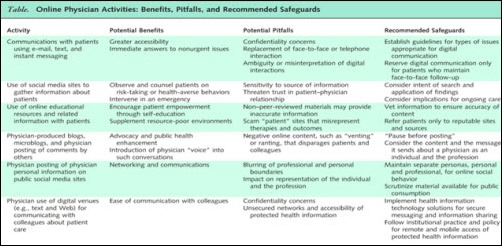Giving a patient medications in the ER, having them pop positive on a test, and then withholding further medications because…
Curbside Consult with Dr. Jayne 4/15/13
The American College of Physicians and the Federation of State Medical Boards recently released a policy statement regarding online medical professionalism. It discusses a variety of online activities with pros and cons. It also recommends safeguards for each type of activity.
Until I read this position paper, I hadn’t really thought about looking up patients on Google. To be honest, when I’m seeing patients I’m too busy trying to actually perform patient care tasks, document until my fingers are numb, and fill out mindless paperwork. I don’t have time to see if there are pictures of them smoking when they say they don’t. On the flip side, I know patients Google us. I’ve had patients in the ER who stalk me online before I walk in the room, and that’s kind of creepy.
I also didn’t know before reading this that the Federation of State Medical Boards has specifically discouraged physicians from “interacting with current or past patients on personal social networking sites such as Facebook.” Thinking about it, the only patients I am connected with on Facebook are nurses that I counted as friends before they were my patients.
The statement includes a section on “airing of frustrations and venting” as having the potential to “undermine trust in the profession.” Specifically it cautions against criticizing late-arriving patients or patients who aren’t following their diets or working on weight loss. Based on the comments of anonymous physicians I follow on Twitter, those are the mildest offenses.
In an informal review of three days’ of Twitter feeds, I found most complaints around: drug seekers; patients who lie; patients who present to the emergency department for extremely minor or nonsensical reasons; patients who abuse or threaten violence against clinicians; and physicians not getting to take a meal or bio break during their shifts. That would seem to me that the FSMB might be a little out of touch with the realities of being in the patient care trenches. I agree that posting patient-specific information is not appropriate. Even if you black out the identifying information, I don’t think medical images belong on Twitter, and one of the physicians I follow has started doing that recently.
The position paper gets a little pedantic when it starts talking about the social contract between physicians and society. Whoever wrote that section must be a subspecialist who trained in the Marcus Welby era, because for those of us younger primary care physicians, I’m not sure we’ve really experienced that degree of social contract. It states, “In exchange for the privilege of caring for patients, as well as the status, respect, and financial compensation that accompanies that privilege…” that physicians must meet societal expectations regarding professionalism.
Although I agree that caring for patients is a privilege, I disagree on the rest of the points. Physician social status is on the decline, as is financial compensation. Frankly, most of the IT managers in my department make more than the starting primary care physician. Until recently, my student loan payment was more than my mortgage. (And no, I didn’t buy a big house – I finally paid off the loans.) When patients became “customers” and we became “providers,” the social contract started to unravel. Don’t get me started on the commoditization of health care.
Patients who are used to trusting Dr. Oz and Dr. Google for medical advice argue with us and refuse to be accountable for their own health. Patients threaten to sue before a diagnosis is even given. Patients complain on multiple social media sites and clinicians are powerless to present their sides of the stories. Expectations are at an all time high – after all, IBM’s Watson can replace us – and respect is at an all-time low. The fact that physicians vent online should be no surprise to anyone.
As an anonymous blogger, I’m used to drawing clear lines in my online behavior, so the release of this position paper isn’t going to change how I operate. What do you think? E-mail me.




More policies and guidelines for physicians. As if they need more. I did like that the American College of Physicians presented them in a chart so that I didn’t have to read through all of the rhetoric. Thoughtful. I do find this informative, however. As a marketing and communications professional, I would suggest that perhaps the “online activity” could be addressed in practice or enterprise communications plans or planning and incorporated into an outreach strategy. Physicians don’t have to or aren’t the only ones who have to or could do the “online activity”….
Also lots of discussion after the WSJ article about physicians emailing patients. I think Dr. Jayne brings up some interesting questions, points for discussion relative to appropriate activities and which ones physicians might “choose” to engage and if those activities can be sustained.